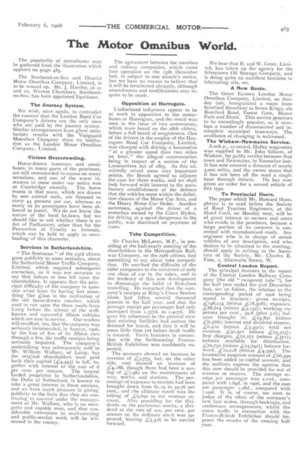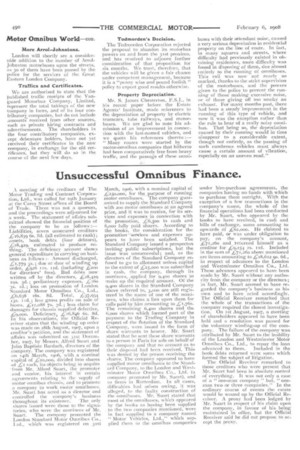The Motor Omnibus World.
Page 7

Page 8

If you've noticed an error in this article please click here to report it so we can fix it.
The popularity of motorbuses may be gathered from the illustration which appears on page 485.
The Southend-on-Sea and District Motor Omnibus Company, Limited, is to be wound up. Mr. J. Hartley, of 21 and 22, Weston Chambers, Southendon-Sea, has been appointed liquidator.
The Journey System.
We wish, once again, to contradict the rumour that the London Road Car Company's drivers are the only ones who are paid by the journey system. Similar arrangements have given satisfactory results with the Vanguard Motorbus Company since its institution as the London Motor Omnibus Company, Limited.
Vicious Overcrowding.
Horse-drawn tramcars and omnibuses, in many parts of the provinces, are still overcrowded to excess on many occasions, and one of the worst instances to come under our notice was at Cambridge recently. The horse trams in that town, which are drawn by one animal each, are licensed to carry 44 persons per car, whereas as many as 70 passengers have been allowed to travel. We do not know the nature of the local by-laws, but we should like to ask whether there is no Act of Parliament, other than for the Prevention of Cruelty to Animals, which can be held to apply to overloading of this character.
Services in Sutherlands hire.
"The Scotsman " of the 23rd ultimo gave publicity to some statistics, about the Sutherland Motor Traffic Company, Limited, which required subsequent correction, as it was not accurate to say that failure or loss fell upon the shareholders. It appears that the principal difficulty of the company in question arose from its having lost something like Z600 in the realisation of the old horse-drawn coaches, which used to run upon the three roads from Lairg, before the advent of the wellknown and successful Albion vehicles which are now in service. Our readers will recollect, too, that the company was seriously incommoded, in August, 1906, by the loss of five of its Albion cars through a fire, the traffic receipts being seriously impaired. The company's undertaking was subsequently sold to Mr. William Wallace, of Lairg, but the original shareholders were paid back their capital (Z4,455) in full, together with interest at the rate of 6 Der cent, per annum. The largest landed proprietor in Sutherlandshire, the Duke of Sutherland, is known to take a great interest in these services, and we have much pleasure in giving publicity to the facts that they are continuing to succeed under the management of Mr. Wallace, who is an energetic and capable man, and that considerable extensions in mail-carrying and public-service work will be witnessed in the county. The agreement between the omnibus and railway companies, which came into operation on the 15th December last, is subject to one month's notice, but we have no reason to believe that it will be terminated abruptly, although amendments and modifications may require to be made.
Opposition at Harrogate.
Undisclosed influences appear to be at work in opposition to the motorbuses at Harrogate, and the result was seen in the issue of two summonses, which were heard on the 28th ultimo, before a full bench of magistrates. One of the drivers in the employ of the Harrogate Road Car Company, Limited, was charged with driving a locomotive "at a greater speed than two miles an hour," the alleged contravention being in respect of a section of the Locomotives Act of 1865. As this admittedly raised some very impOrtant points, the Bench agreed to adjourn the case for three weeks, and we shall look forward with interest to the satisfactory establishment of the defence that the vehicles come within the definition clauses of the Motor Car Acts, and the Heavy Motor Car Order. Another summons, against the driver of a motorbus owned by the Cairn Hydro, for driving at a speed dangerous to the public, was dismissed on payment of costs.
Tube Competition.
Sir Charles McLaren, M.P., in presiding at the half-yearly meeting of the shareholders in the Metropolitan Railway Company, on the 29th ultimo, had somethingto say about tube competition. He ascribed the difficulty of the older companies to the existence of only one class of car in the tubes, and to the tendency of this new development to discourage the habit of first-class travelling. He remarked that the company's receipts at King's Cross Station alone had fallen several thousand 'pounds in the half year, and that the average receipt per passenger had only increased from r .377d. to 1.407d. He gave his adherence to the general view that existing facilities had outrun the demand for travel, and that it will be some little time yet before fresh traffic is created. Extra business in connection with the forthcoming FrancoBritish Exhibition was confidently expected.
The accounts showed an increase in revenue of Z3,775, but, on the other side, coal showed an increase of £4,188, though there had been a saving of Zr,982 on the maintenance of way, works, and stations. The percentage of expenses to receipts had been brought down from 62.19 to 59.76 per cent., and the ultimate result was the taking of ;4,-9,600 to net revenue account. After providing for the dividends on the preference stocks, a dividend at the rate of tos, per cent, per annum on the ordinary stock was approved, leaving L5,516 to he carried forward.
We hear that H. and W. Greer, Limited, has taken up the agency for the Silvertown Oil Storage Company, and is doing quite an excellent business in lubricating oils, etc.
A New Route. ,
The Great Eastern London Motor Omnibus Company, Limited, on Sunday last, inaugurated a route from Stratford Broadway to Seven Kings, via Romford Road, Forest Gate, Manor Park and Ilford. This service promises to be exceedingly popular, as it overlaps a number of disconnected and incomplete municipal tramways. The avoidance of changing is welcomed.
The Wishaw-Newmains Service. A 2oh.p., 12-seated, Halley wagonette was supplied to Mr. John Gibson, of Wishaw, for public service between that town and Newmains, in November last. It has now covered a distance of nearly 4,000 miles, and the owner states that it has not been off the road a single hour through defects. He has now given an order for a second vehicle of this type.
To Provincial Users.
The paper which Mr. Howard Humphreys is to read before the Society of Road Traction Engineers, at the Hotel Cecil, on Monday next, will he of great interest to owners and users who reside in the provinces, because a large portion of its contents is concerned with macadamised roads. Any engineer who is in charge of motor vehicles of any description and who desires to be admitted to the meeting, should apply in writing to the Secretary of the Society, Mr. Charles E. Esse, /, Albemarle Street, W.
Central London Report.
The principal features' in the report of the Central London Railway Company (the old " twopenny tube "), for the half year ended the 3 tst December last, are as follow, the relation to the corresponding period of 1906 being stated in brackets : gross receipts, £148,234 (minus Z18,508); expenses, £88,614 (minus £5,152); working expenses per cent., 59.8 (plus 3.6); balance brought in, £25,891 (minus ,Z6,366); interest and dividend reserve, £6,410 (minus L5,591); total net revenue, £91,921 (minus £25,313); first charges, £21,171 (minus £571); balance available for distribution, £70,750 (minus Z24,742); balance forward, £10,218 (minus Z4,390). The locomotive suspense account of £66,90 has been added to capital account, and the auditors express the opinion that this sum should be provided for out of revenue or reserve. The average receipt per passenger was 2.nrd,, compared with 1.84d. in 1906, and the cost per passenger 1.28d., compared with hood. It is, of course, too soon to judge of the effect of the company's new fare scales, through bookings, and conference arrangements, whilst the extra traffic in connection with the Franco-British Exhibition should improve the results of the ensuing half year.
Motor Omnibus World—con. More Arroi.Johnstoos.
London will shortly see a considerable addition to the number of ArrolJohnston motorbuses upon the streets, as 30 of them have been passed by the police for the services of the Great /!:astern London Company.
Traffics and Certificates.
We are authorised to state that the published traffic receipts of the Vanguard Motorbus Company, Limited, Isepresent the total takings of the new tompany in fares, and of its four contributory..companies, but do not include amounts received from other sources, such as private hiring contracts and advertisements. The shareholders in the four contributory companies, except debenture holders, have not yet received their certificates in the new company, in exchange for the old certificates, but they will do so in the course of the next few days.
Todmorden's Decision, The Todmorden Corporation rejected the proposal to abandon its motorbus powers on and from the 3ist proximo, and has resolved to adjourn further consideration of that proposition for six months. We trust, therefore, that the vehicles will he given a fair chance under competent management, because it is a "penny wise and pound foolish " policy to expect good results otherwise.
Property Depreciation.
Mr. S. James Chesterton, F.S.I., in his recent paper before the Estate Agents' Institute, made references to the depreciation of property by electric tramcars, tube railways, and motorbuses. We are glad to note his admission of an improvement in connection with the last-named vehicles, and we quote his references thereto :— " Many routes were started by the motor-omnibus companies that hitherto had been comparatively free from heavy traffic, and the passage of these omni
buses with their attendant noise, caused a very serious depreciation in residential property on the line of route. In fact, in many squares and streets, where difficulty had previously existed in obtaining residences, more -difficulty was found in disposing of them, due almost entirely to the running of omnibuses. This evil was now not nearly so marked, thanks to the strict supervision of the motorbuses, and the powers given to the police to prevent the running of those making excessive noise, or of those giving off too 'smoky an exhaust. For many months past, there had been a steady improvement in the running of this type of vehicle, and now it was the exception rather than the rule to hear of a really noisy omnibus. That being so, the depreciation caused by their running would in time disappear to a considerable extent, though not entirely, as the passing of such cumbrous vehicles must always cause a certain amount of vibration, especially on an uneven road."


















